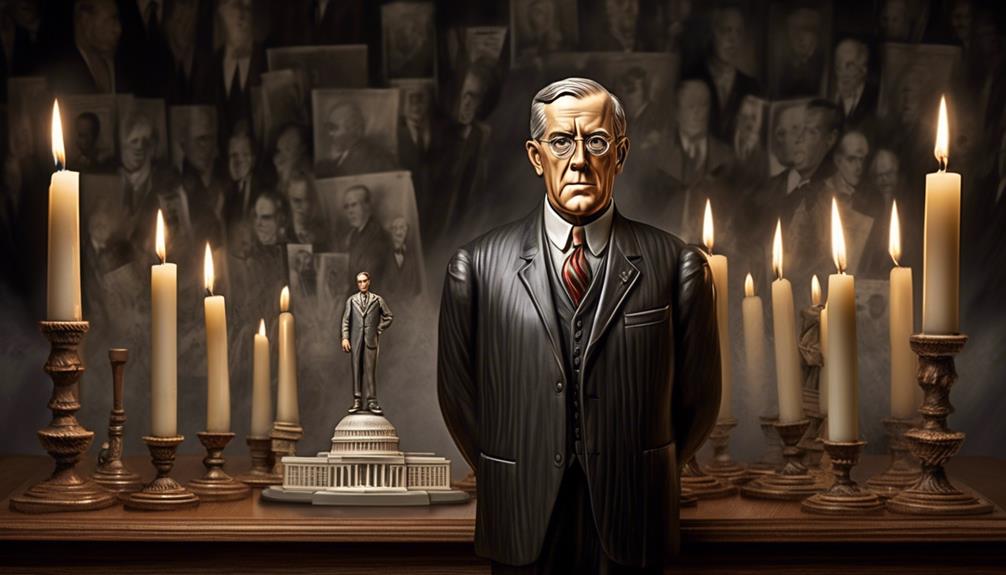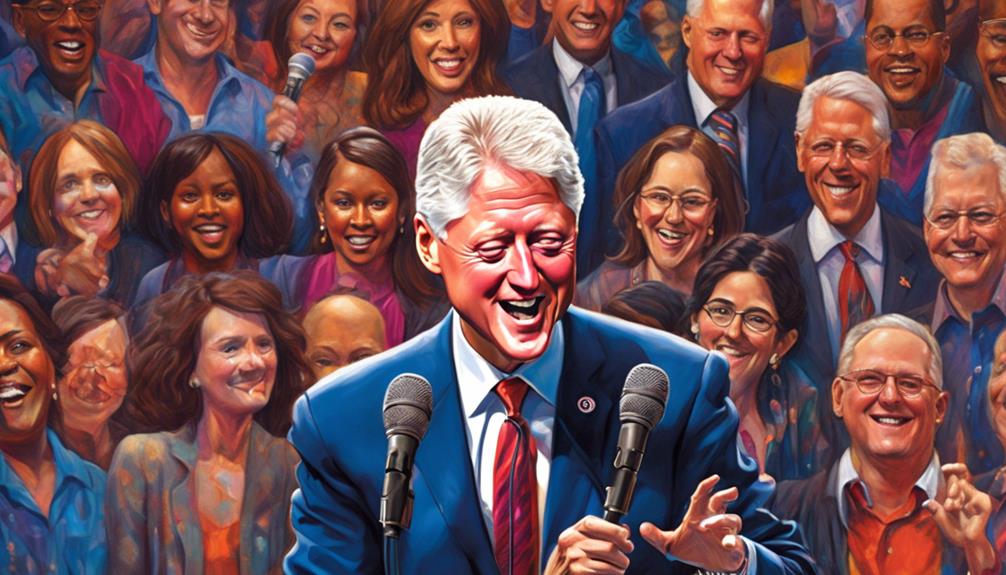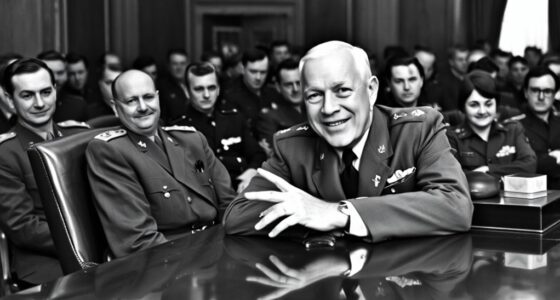Exploring the enduring insights of Woodrow Wilson, the 28th President of the United States, takes us into an era where language wields significant influence and concepts forge countries. Wilson’s statements are not just an assembly of motivational expressions, but emblems of his aspirations for America and the values he cherished.
With his thoughtful and eloquent expressions, Wilson teaches us valuable lessons in leadership, democracy, diplomacy, and international relations. His words resonate with a profound understanding of the complexities of governance and the importance of progress through education.
As we explore Wilson's quotes, we honor his enduring legacy and gain insight into the mind of a remarkable leader who left an indelible mark on American history.
Key Takeaways
- Woodrow Wilson was a progressive leader who aimed to transform the nation through his reforms.
- Wilson's effective communication strategies and clear messaging helped him implement government reforms successfully.
- Wilson believed in the power of words to inspire and motivate individuals, encouraging them to dream big and persevere.
- Wilson's strong belief in democracy and government reform drove his advocacy for inclusive and participatory democracy, where every citizen has a voice.
Wilson's Vision for America
Wilson's vision for America encompassed a series of progressive reforms aimed at transforming the nation into a more inclusive, equitable, and prosperous society. One of the key aspects of Wilson's economic policies was his commitment to breaking up monopolies and regulating big business. He believed that a fair and competitive market was essential for economic growth and the well-being of all Americans. Wilson also introduced the Federal Reserve Act, which established a central banking system to stabilize the economy and prevent financial crises.
In addition to his economic policies, Wilson played a significant role in women's suffrage. He actively supported the passage of the 19th Amendment, which granted women the right to vote. Wilson's advocacy for women's suffrage was a significant step towards gender equality and political empowerment for women.
Leadership Lessons From Woodrow Wilson

When examining Woodrow Wilson's leadership, two key lessons emerge: effective communication strategies and decision-making under pressure.
Wilson was known for his ability to articulate his vision and rally support through clear and persuasive communication.
Additionally, he demonstrated the importance of making tough decisions in times of crisis, showcasing his ability to remain calm and composed under pressure.
Effective Communication Strategies
One can glean valuable insights into effective communication strategies by examining the leadership lessons of Woodrow Wilson.
As the 28th President of the United States, Wilson implemented various government reforms and utilized effective communication strategies to advocate for change.
Wilson understood the importance of clear and concise messaging to engage and persuade his audience. He used his speeches and writings to articulate his vision for government reform, such as the establishment of the Federal Reserve System and the passing of the Clayton Antitrust Act.
Wilson's communication style was characterized by his ability to simplify complex ideas and connect with the American people on an emotional level.
Decision-Making Under Pressure
Under the immense pressure of leadership, Woodrow Wilson consistently demonstrated his ability to make decisive and calculated decisions that shaped the course of American history. Wilson employed various decision-making techniques to handle stress and navigate the challenges of his presidency. One technique he utilized was conducting thorough research and gathering all available information before making a decision. This allowed him to make informed choices and minimize the risk of errors. Wilson also sought advice from trusted advisors and experts, valuing different perspectives to gain a comprehensive understanding of the issues at hand. Furthermore, he prioritized the long-term impact of his decisions, considering the potential consequences and benefits for the nation. By employing these techniques, Wilson was able to make critical decisions under pressure and leave a lasting legacy on the United States.
| Decision-Making Techniques | Handling Stress |
|---|---|
| Thorough research | Seeking advice |
| Gathering information | Prioritizing |
| Consulting advisors | Long-term focus |
The Power of Words: Wilson's Inspirational Quotes
Woodrow Wilson's inspirational quotes demonstrate the profound impact that carefully chosen words can have on individuals and societies alike. As a master of persuasive rhetoric and inspirational speaking, Wilson possessed the ability to motivate and inspire people through his words.
One of his most famous quotes, 'We grow great by dreams. All big men are dreamers,' encapsulates his belief in the power of imagination and ambition. This quote not only encourages individuals to dream big but also emphasizes the importance of perseverance in achieving greatness.
Wilson's words have the ability to resonate with people from all walks of life, instilling in them a sense of hope, determination, and the belief that they can overcome any obstacles they may face.
Another notable quote by Wilson, 'The ear of the leader must ring with the voices of the people,' highlights his understanding of the importance of listening to the needs and desires of the people he served. This quote demonstrates Wilson's commitment to democratic values and his belief that effective leadership requires empathy and responsiveness.
Wilson's inspirational quotes continue to inspire and empower individuals to this day, serving as a testament to the enduring power of words.
Wilson's Views on Democracy and Government
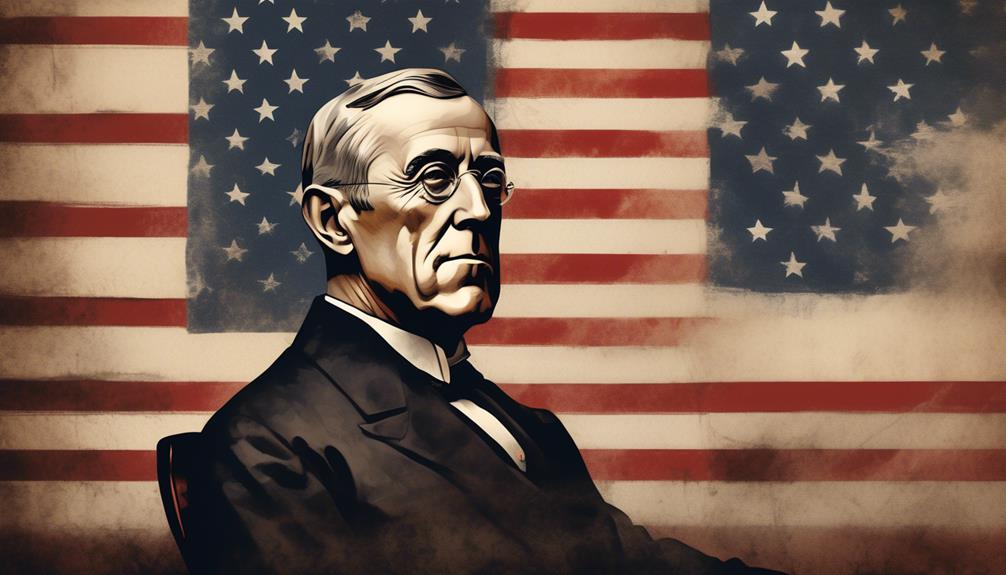
Wilson's views on democracy and government were rooted in his strong belief in democratic principles and his desire for government reform. He advocated for a more inclusive and participatory democracy, where every citizen had a voice and could actively contribute to the decision-making process. Wilson also proposed reforms to make the government more efficient and accountable, such as the creation of the Federal Reserve System and the implementation of the progressive income tax.
His ideas on democracy and government continue to shape political discourse and influence policy-making today.
Wilson's Democratic Principles
Throughout his presidency, Woodrow Wilson emphasized the importance of democratic principles in shaping the direction of the United States government. Wilson's political ideology centered around the idea that the government should be responsive to the needs and aspirations of its citizens. He believed in the power of the people to participate in the decision-making process and advocated for an active and engaged citizenry.
Wilson's impact on civil rights was significant, as he supported legislation that aimed to protect the rights of marginalized groups, such as women and African Americans. He signed the 19th Amendment, granting women the right to vote, and established the Federal Civil Rights Commission to investigate and address issues of racial discrimination.
Wilson's democratic principles laid the foundation for a more inclusive and progressive government.
Government Reform Ideas
Government reform ideas were a central focus of Woodrow Wilson's presidency, as he sought to enhance democracy and improve the functioning of the United States government. Wilson believed in the importance of government transparency and citizen engagement to ensure a well-functioning democracy. His reform ideas aimed to make the government more accessible and accountable to the people.
Here are two key aspects of Wilson's government reform ideas:
- Government transparency:
- Wilson advocated for greater openness and transparency in government operations.
- He believed that citizens should have access to information about government decisions and actions.
- Citizen engagement:
- Wilson emphasized the importance of active citizen participation in the democratic process.
- He believed that citizens should be engaged in decision-making and have a voice in shaping government policies.
Wilson's government reform ideas aimed to strengthen democracy by promoting transparency and citizen involvement in the governance of the United States.
Lessons in Diplomacy From Woodrow Wilson
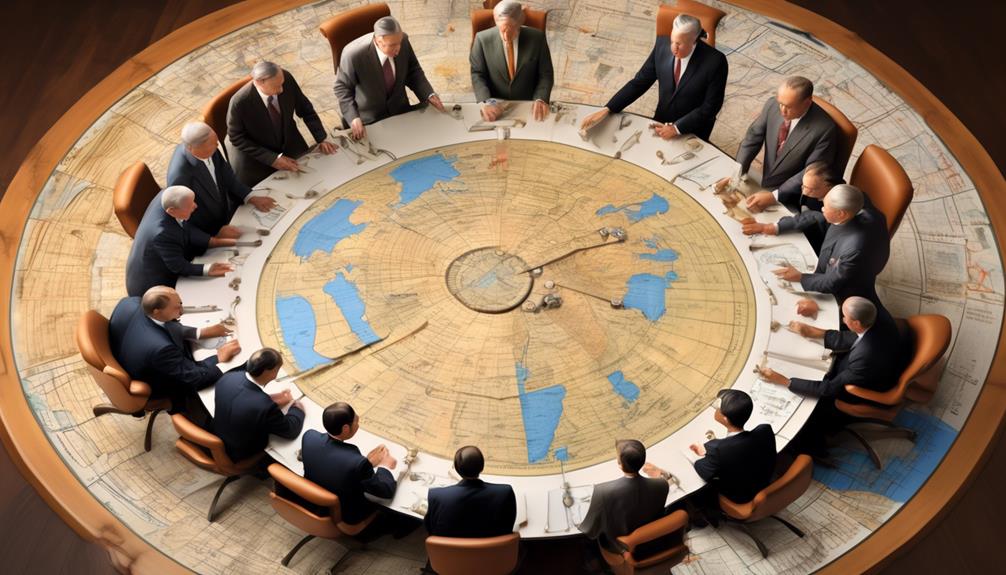
Woodrow Wilson's diplomatic approach offers valuable lessons in navigating international relations with tact and skill. His strategies for diplomatic negotiations and conflict resolution provide insights that can be applied to contemporary global challenges.
Wilson believed in the power of open and honest communication as a foundation for successful diplomacy. He emphasized the importance of diplomacy as a means to prevent conflicts and promote peaceful resolutions. Wilson advocated for the use of negotiation and mediation to address disputes, rather than resorting to force or aggression.
One key lesson from Wilson's approach is the significance of understanding the perspectives and interests of all parties involved. Wilson believed that by actively listening and empathizing with different viewpoints, diplomats could find common ground and build consensus. He also stressed the importance of compromise and finding mutually beneficial solutions that address the underlying concerns of all parties.
Another lesson from Wilson's diplomacy is the need for transparency and accountability. He championed the idea of open diplomacy, advocating for the public disclosure of negotiations and treaties. Wilson believed that transparency would enhance trust among nations and ensure that diplomatic agreements were in the best interest of all parties involved.
Wilson's Perspective on International Relations

Wilson's perspective on international relations was shaped by his belief in the power of diplomacy and the importance of understanding and addressing the perspectives and interests of all parties involved. He believed that international cooperation and diplomatic negotiations were essential for maintaining peace and resolving conflicts.
To understand Wilson's perspective on international relations, it's important to consider the following:
- International Cooperation
- Wilson emphasized the need for countries to work together and form alliances based on mutual interests and shared values.
- He believed that through collaboration, nations could effectively address global challenges and promote peace and stability.
- Diplomatic Negotiations
- Wilson advocated for peaceful resolutions to international disputes through diplomatic negotiations.
- He believed that open dialogue and compromise were key to avoiding conflicts and fostering understanding between nations.
Wilson's approach to international relations aimed to establish a new world order that prioritized diplomacy and cooperation over aggression and confrontation. His vision was grounded in the belief that by understanding and considering the perspectives and interests of all parties, sustainable peace could be achieved.
Wilson's ideas continue to shape diplomatic strategies and serve as a reminder of the importance of dialogue and collaboration in international affairs.
Honoring Wilson's Legacy: Quotes on Education and Progress

To honor the enduring legacy of Woodrow Wilson, we examine his insightful quotes on education and progress. Wilson believed that education was essential for the progress of individuals and society as a whole. He emphasized the importance of education in shaping the minds of future generations and preparing them to tackle the challenges of a rapidly changing world. Wilson's vision for education was rooted in the belief that knowledge and critical thinking were key to a prosperous and democratic society.
In order to illustrate Wilson's perspective on education and progress, let's take a look at some of his notable quotes:
| Quote | Analysis |
|---|---|
| "The whole art of teaching is only the art of awakening the natural curiosity of young minds for the purpose of satisfying it afterwards." | Wilson recognized that education should inspire curiosity and encourage students to seek knowledge and answers for themselves. |
| "I not only use all the brains that I have, but all that I can borrow." | Wilson emphasized the importance of collaboration and the exchange of ideas in the pursuit of progress. |
| "Education does not mean teaching people to know what they do not know; it means teaching them to behave as they do not behave." | Wilson believed that education should not only focus on knowledge acquisition, but also on shaping individuals' behavior and character. |
Wilson's legacy in education and progress is evident in his belief that education should empower individuals to think critically, collaborate, and positively impact society. His quotes serve as a reminder of the importance of education as a catalyst for progress and a key component of a thriving democracy.
The Enduring Wisdom of Woodrow Wilson
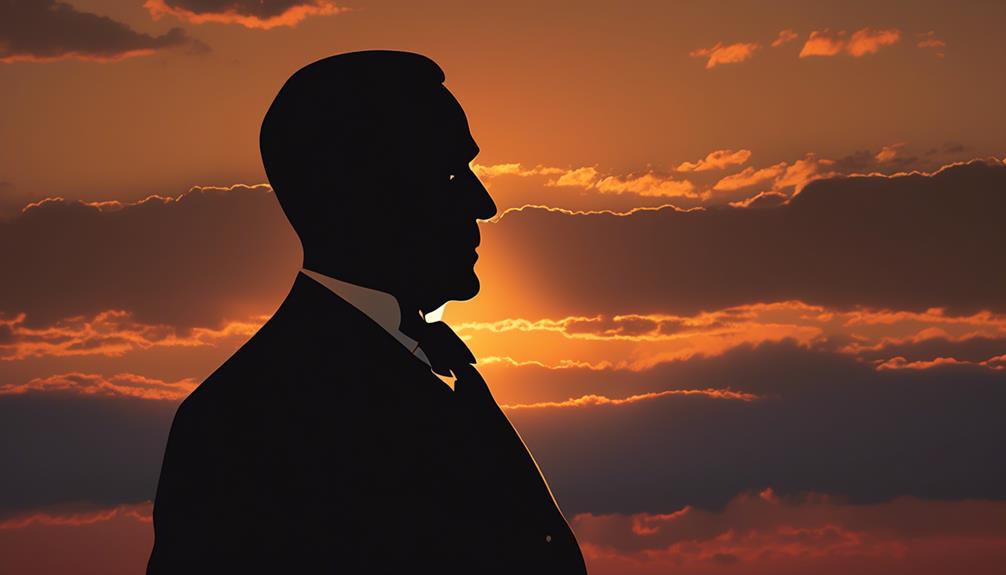
As we continue our exploration into the enduring wisdom of Woodrow Wilson, we now shift our focus to his remarkable insights and contributions beyond the realm of education and progress. Wilson's leadership qualities and political philosophy continue to resonate and provide valuable lessons for today's leaders.
Here are two key aspects of Wilson's enduring wisdom:
- Leadership Qualities:
- Visionary: Wilson had a clear vision for a better future and worked tirelessly to achieve it. His visionary leadership inspired others to join him in his pursuit of progress.
- Resilience: Despite facing numerous challenges and setbacks, Wilson remained steadfast in his convictions and never wavered from his goals. His ability to persevere in the face of adversity is a testament to his strong leadership.
- Political Philosophy:
- Idealism: Wilson believed in the power of ideals to shape the world. He advocated for a more just and equitable society and sought to promote democracy and self-determination on a global scale.
- Internationalism: Wilson was a staunch supporter of international cooperation and believed in the importance of working together to address global issues. His advocacy for the League of Nations laid the groundwork for future efforts in international diplomacy.
Wilson's enduring wisdom in these areas provides valuable insights for leaders today, reminding us of the importance of vision, resilience, idealism, and international cooperation in shaping a better future.
Frequently Asked Questions
How Tall Was Woodrow Wilson?
Woodrow Wilson's height is a topic of interest to many. While we don't have the exact measurements, historical records suggest that he stood at around 5 feet 11 inches tall.
Now, let's shift our focus to another fascinating aspect of Wilson's life: his favorite books. Wilson was known for his love of literature and often found solace in the works of Shakespeare, as well as the writings of political philosophers like John Locke.
What Was Woodrow Wilson's Favorite Food?
Woodrow Wilson's favorite food reveals an intriguing glimpse into the culinary preferences of the 28th President of the United States. While we may not have specific information regarding his favorite dish, it's fascinating to explore the tastes and flavors that might've delighted his palate.
Considering the time period and Wilson's sophistication, it's likely that his favorite food encompassed a refined and elegant cuisine, perhaps featuring classic American dishes or international delicacies. Exploring this aspect of his life provides valuable insight into Wilson's personal preferences and cultural influences.
Did Woodrow Wilson Have Any Pets?
Yes, Woodrow Wilson did have pets.
In his childhood, Wilson had a pet goat named 'Old Ike' that he loved dearly. He'd often take the goat for walks around the neighborhood, much to the amusement of his neighbors.
Later in life, as President of the United States, Wilson had a flock of sheep that grazed on the White House lawn to help with war efforts.
These pets added a touch of charm and uniqueness to Wilson's life and presidency.
What Were Woodrow Wilson's Hobbies Outside of Politics?
Woodrow Wilson's hobbies outside of politics included literature and writing, as well as golf and tennis. He was an avid reader and enjoyed writing essays and books on various topics.
In addition, Wilson was known to be a skilled golfer and tennis player. These hobbies provided him with a way to relax and unwind from the demands of his political career.
How Many Siblings Did Woodrow Wilson Have?
Woodrow Wilson had two sisters and one brother, making a total of four siblings.
In his childhood and upbringing, Wilson's relationship with his siblings played a significant role in shaping his character and values. The bond he shared with them fostered a sense of companionship and mutual support, which later influenced his leadership style as the 28th President of the United States.
Wilson's experiences with his siblings showcased the importance of familial connections and their impact on personal growth.
What Influence Did Woodrow Wilson Have on Jaap De Hoop Scheffer’s Leadership?
Woodrow Wilson’s influence on Jaap De Hoop Scheffer’s leadership can be seen in the way Scheffer values the power of diplomacy and international cooperation. In line with jaap de hoop scheffer quotes, he has shown a commitment to creating alliances and finding peaceful resolutions to conflicts, reflecting Wilson’s vision for global unity.
Conclusion
In conclusion, Woodrow Wilson's quotes and views offer valuable insights into leadership, democracy, diplomacy, international relations, education, and progress.
While it's important to acknowledge the controversies surrounding his presidency, such as his handling of racial issues, we can still appreciate the enduring wisdom he left behind.
By examining Wilson's vision for America and the lessons we can learn from him, we can gain a deeper understanding of history and use his quotes as inspiration for personal growth and societal progress.
